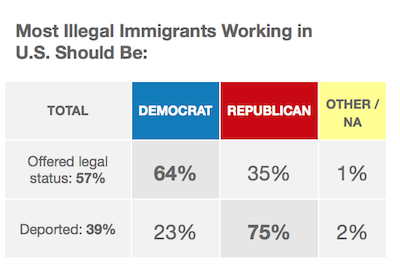Some of the GOP spin, after last week’s midterms elections, is that the party has a mandate for its anti-immigrant, restrictionist ideas. That’s something Sen. Jeff Sessions (R-AL) recently tried to claim — that last week’s results are one reason why President Obama should not announce executive action for immigrants. Markos today, at a post at Daily Kos, slams that idea. Polls have consistently shown that a majority of Americans, including more than a third of Republicans, who voted in this election want real immigration reform. As Markos writes:
That’s right. By a massive 57-39, voters from the most conservative electorate since forever want “amnesty.” Over one-third of Republicans want “amnesty.” So when the apparently illiterate Sessions says “President Obama made clear that he would attempt to void the election results—and our laws—by moving forward with his executive amnesty decree,” he is sputtering sheer nonsense. Because the views of the electorate couldn’t be more clear and—ahem—unequivocal: Americans want to legalize our nation’s undocumented population despite Sen. Sessions’s attempts to rewrite reality.
And that’s exit polling from a year when Latino voters were not particularly a force. As Alan Gomez at USA Today notes, that’s going to change in a very big way in 2016. Which means that what President Obama does on executive action this year has enormous consequence for Latino voters and how they feel about the Democratic Party:
In 2016, at least a half-dozen close Senate races will be held in states where larger shares of the population are Hispanic.
There’s Nevada, where 27.5% of the population is Hispanic and outgoing Senate Majority Leader Sen. Harry Reid, D-Nev., is expected to face a stiff GOP challenge. There’s Florida, where 23.6% of the population is Hispanic and Sen. Marco Rubio, R-Fla., may face criticism for backing away from the Senate immigration bill he co-authored.
There are Republicans in Arizona (30.3% Hispanic), Illinois (16.5%), Utah (13.4%) and Idaho (11.8%) who have taken varying approaches to immigration and will be tested. Some, such as Sen. John McCain, R-Ariz., have advocated for undocumented immigrants to eventually be eligible for U.S. citizenship. Others, such as Sen. Mike Lee, R-Utah, have fought against such “amnesty.”
And then there’s the presidential race.
Hispanics turn out in far greater numbers during presidential elections, so their voice will be amplified. Republicans learned just how loud that voice can be in 2012, when GOP candidate Mitt Romney garnered just 27% of the Hispanic vote, which helped seal his fate.
That means the actions taken in Washington over the next few months could go a long way toward determining our 45th president.


